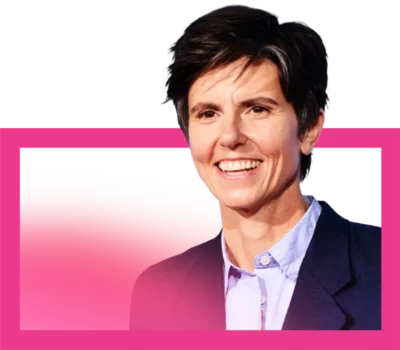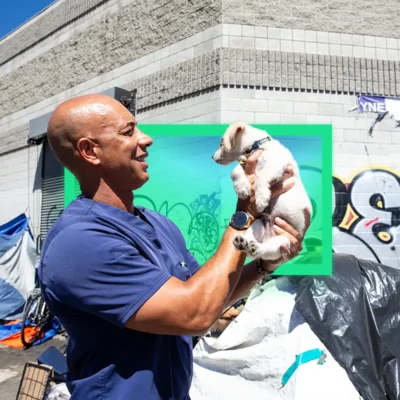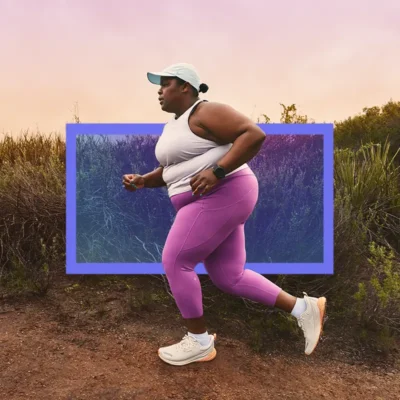There’s more than one way to get there
The many highs of Tig Notaro’s comedy career (Emmy and Grammy nominations, creating TV shows, and hosting the “Don’t Ask Tig” podcast) may seem predestined. Yet these are all things that seem beyond the realm of possibility for young Tig. In the early 2000s she’s told that because she’s a woman, and she’s gay, and she’s low-key and deadpan, she’ll never make it. Today, she shares the story of how she learns to keep going, no matter how impossible the road may seem, and to remember that there’s no one way to get somewhere.
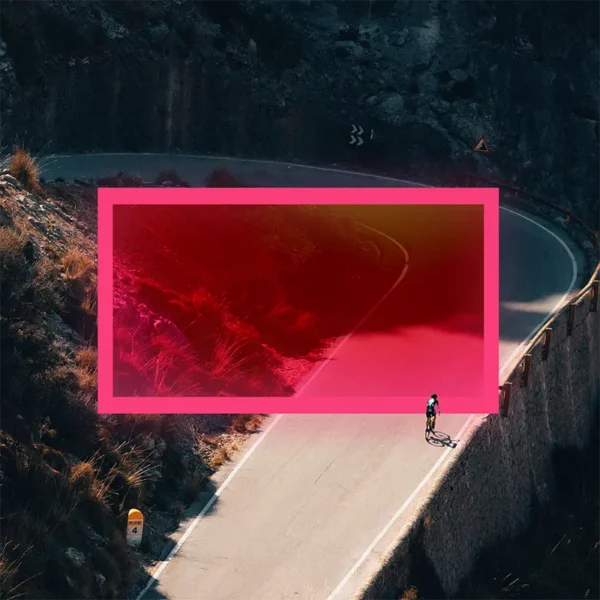
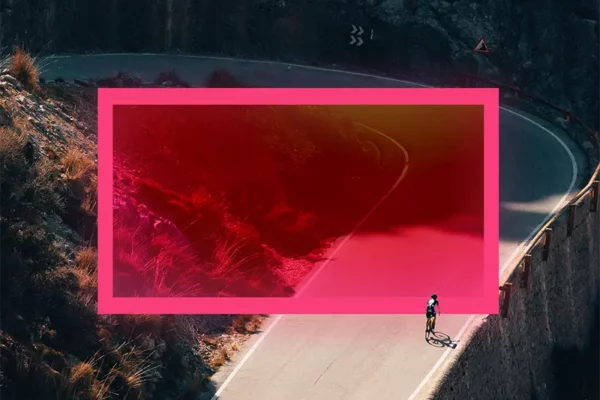
Table of Contents:
Transcript:
There’s more than one way to get there
TIG NOTARO: The production company office is filled with a constant ringing of phones and the voices of my coworkers. I’m 29-years-old, sitting at my desk. It’s my job to answer calls, take down messages, and greet people. 29-year-old Tig should not be a greeter. I don’t even necessarily think I should greet people now.
ROHAN GUNATILLAKE: Tig Notaro graces the world’s biggest stages as a standup comedian. She’s accrued Grammy and Emmy nominations, appeared in blockbuster films, and hosts the delightful podcast “Don’t Ask Tig.” Yet, this illustrious career is one that seems far beyond the realm of possibility for young Tig. This week, Tig tells the story of how after dropping out of school in ninth grade, she embarks on a journey which teaches her there’s no one way to get somewhere.
In this series, we combine immersive first-person stories, breathtaking music, and mindfulness prompts so that we may see our lives reflected back to us in other people’s stories. And that can lead to improvements in our own inner lives.
From WaitWhat, this is Meditative Story. I’m Rohan, and I’ll be your guide.
The body relaxed. The body breathing. Your senses open, your mind open, meeting the world.
NOTARO: The air conditioning is on full blast. It works overtime on hot Texas afternoons like this. I lean back in my usual chair in the vice principal’s office. I look around at the framed photos of horses and pigs and pet dogs that hang on the walls between the normal school office decorations.
Ms. Copeland, my vice principal, looks at me from across her desk with a knowing smile. She’s not at all surprised to see me here again. I’m fourteen and not exactly what you would call a “good student.” I talk too much, skip class, smoke cigarettes. I made it through seventh grade, but then failed eighth grade twice. The school decided to move me up anyway. Now I’m failing ninth grade too.
I can tell my teachers are frustrated that I’m not doing my work, but Ms. Copeland is always kind. She’s in her 40s, with short hair and a runner’s build. She’s no nonsense, but friendly. Always goes above and beyond to try and help me. She leans across her desk. I brace myself for another well-meaning lecture about how I need to focus.
“You know,” she says, “Some successful people in this world have dropped out of high school. I don’t encourage it, but it sometimes happens.”
Oh.
I can’t believe she’s telling me this. But she looks serious. And then she adds, “The singer George Michael dropped out of high school and he became a huge success.”
“Wow,” I say. “George Michael.”
It’s such an odd thing to say, but I think this is her way of saying…maybe this isn’t right for me.
“Listen to your gut,” she says. I nod and say, “Okay.” But I’m not totally sure how to do that.
The truth is, I’ve been thinking about leaving school for awhile. I’m concerned my parents won’t like that idea, but I don’t imagine I’ll ever have a job that’ll require college. I picture myself delivering pizzas or being one of those people that waves an orange construction sign at the side of the road.
I’m certainly not trying to be George Michael.
I guess, if I’m really, really honest with myself about what I want to do, the answer is comedy. It’s what I really love. That just feels so far out of reach. Professional comedian? It’s like saying I want to be an astronaut or the President of the United States. It feels impossible.
But sitting here in my vice principal’s office for the thousandth time, I know staying put isn’t working for me either. School is holding me back. I just want to get out into life. When I listen to my gut, the only thing I hear is, “I gotta get out of here.” Even if I don’t know where I’m going.
The production company office is filled with a constant ringing of phones and the voices of my co-workers. I’m 29-years-old, sitting at my desk, which is out in the middle of the room. It’s my job to answer calls, take down messages, and greet people. 29-year-old Tig should not be a greeter. I don’t even necessarily think I should greet people now.
I look out at the welcome area where a few people sit on the couch and wait for meetings. It’s LA. Everybody wants meetings.
This office building isn’t beautiful, but it’s nice — a little sterile. There are potted plants here and there. Boxes of film merchandise and posters of TV shows the company produced. It’s like most workplaces for film and TV production companies. When it’s busy, it’s really busy, and when there’s downtime, it’s really downtime.
As I sit, waiting for the phone to ring, I look up and see my boss walking toward me. He’s the president of the company, so he’s dressed a little nicer than everybody else. At least, nicer than my jeans and t-shirt. He hands me a small piece of paper. I recognize it from my carbon copy notepad.
“See anything missing?” he says. I look down at the paper to see, in my handwriting, some guy’s name followed by 9 digits. Oops. I missed the last digit of the phone number.
My boss gives me a quick smile, partly amused, but partly irritated. He hands me the paper before walking back to his office. I sigh. Now I have to try calling ten phone numbers to see if I can get a hold of this guy.
I pick up the receiver and start punching numbers. As I listen to the dial tone, my mind wanders to where I’ll be tonight: telling jokes onstage. I usually get off work between 6 and 7, and by 8 I’m doing standup somewhere. I do that seven nights a week. It can be tiring, but it lets me be around like-minded people, doing what I’m passionate about.
It’s where I wish I could be all the time.
This job isn’t what I expected to be doing when I dropped out of high school, but pays a good salary. I get health insurance, free meals. I even get a holiday bonus and my own flip phone. And I’ve made a lot of friends at this job. There are great people here.
There’s also a fair amount of drama. I keep hearing whispers about corruption, and that certain people on staff are lying, or stealing. A lot of my work friends ask each other, “Are we going to stay? Are we going to leave?”
I’m starting to think my day job has run its course. That, maybe, I should just quit and try doing stand-up full time.
That thought is exhilarating, but it’s also terrifying. If I leave this job, I lose my stability. I’ll have to get a credit card to pay for the gas I need to drive to gigs. And that means debt. Plus, I don’t see a clear path for me in comedy. It’s the early 2000s. People tell me that because I’m a woman, and I’m gay, and I’m low-key and deadpan, I’ll never make it past a certain point. I’ll never be a headliner, get into higher paying clubs, or do talk shows or be mainstream.
I’m told there’s only so much I can hope for myself, which is depressing.
The number I dial doesn’t go through to anyone, so I try again with the next one. It rings and rings. I hang up and try again, but I’m not really focused on what I’m doing. I want to find a workaround for comedy. Regardless of that feedback I’m getting, I want to see how I can make it happen anyway.
GUNATILLAKE: Have you ever felt — or maybe you’ve been told — that someone like you doesn’t get to where you want to go. Like your journey ahead is impossible. If so, our bodies can become closed as a response. Let’s balance that out by opening — opening our chest and breathing. Softening to the idea that there are infinite paths ahead of us.
NOTARO: With my legs pumping up and down, I lean forward and grip the handlebars of my bike. On all sides, I’m surrounded by the New England summer. I see old wooden bridges crossing streams and rivers. Rural areas and tiny towns with ice cream shops. It’s all so picturesque.
Or it would be, if I weren’t going uphill.
I’m in the middle of a multi-day bike ride from Montreal to Portland, Maine to raise money for AIDS research. There are thousands of cyclists on the same route, and I keep pretty good pace with them. But this long incline I’m on right now is brutal.
My legs become noodles. Sweat drips down my face. The road ahead of me seems to rise up and up with no end in sight. I have no idea how long this will last. I see a couple of riders ahead of me stop to walk their bikes. That seems like a terrible idea. I tell myself, I have to keep pedaling. I have to keep moving forward. It’s the only option.
I try to control my breathing. I change gears when I need to. I continue to push.
Finally, I reach the top. The road begins to even out. It curves into a heavily wooded area, full of trees. The odometer on my bike tells me that incline was 8 miles long. I cannot believe I did it. I biked all the way up. My heart is pounding. But I’m feeling empowered. My mind is clear.
This is what I need right now. I sign up for this bike race when I finally decide to quit my day job. It feels like a big leap, with some definite financial insecurity. But I think it’s the right decision. The months of training and multiple days of long-distance cycling give me a way to mark this big life transition in a positive way. I’ve always liked cycling. It’s a time when I can find peace inside my head, connect the dots in my life. And right now it feels important to do something good for others, and for myself. It’s a cleansing experience.
I’m now on mile 70 of the day’s 100-mile ride. I breeze past rows of sunflowers and fields of corn. I fall into the rhythm of it. Everything feels clear and focused. 30 miles to go.
Just as I’m cresting a small rise, there’s a sharp, excruciating pain in my knee. My leg seizes up. It hurts. I pull over to the side of the road. My surroundings drop away. Suddenly, all of my focus is on my knee. I try to massage it and I gently rotate my bike pedal. It feels like it’s completely blown out. There’s no way that leg can pedal for 30 more miles.
Other cyclists blow past me. I consider my options. I could call it quits. But I want to reach the end of today’s ride. I want to make everything that came before this worth it.
I unclip my shoe from the bike pedal. I rest that foot on the fork of my bike frame, and test out what it will feel like to pedal with one leg. I can keep up the momentum since one foot is still clipped in. I imagine that at the end of the ride, I’m going to have one thigh that’s twice as big as the other. Twice the muscle mass. That my body will forever be imbalanced. But I keep going.
As hard as I’m pedaling with my one good leg, I start to fall further and further behind all of the other cyclists. The sun is beating down on me. I can feel my sunburn.
More and more bikes are passing me. Until suddenly, they aren’t. I realize I’m the very last cyclist. It sounds like an exaggeration, but out of the thousands here, I really am the last one. I hear vans rolling up behind me. They’re there to offer rides to any stragglers. I can not bring myself to let them pick me up.
I want to finish by myself, even if it’s in this very unconventional and painful way of cycling.
I’m dripping in sweat and my body aches. I feel beaten down and exhausted. But as I close in on the final miles, I also feel like the strongest person alive.
Finally, I make it to the finish line. I’m dead last. I have barely an ounce of energy left in my body. But I do it. A friend of mine who came on this trip with me is waiting there. And as I cross the finish line, she bursts into tears. She’s so emotional seeing me pull in last. She doesn’t even know why it took me so long.
GUNATILLAKE: This is quite the moment. See if you can notice your own reaction. Maybe it’s joy, resonating with Tig’s achievement? What path would you have taken to the finish line? There’s no wrong way, just your way.
NOTARO: After today, I feel more ready than ever for what’s next. I feel validated in my choice to go all-in on what I want — completely abandon my life as I know it, and devote 100% of my time and energy to my stand-up career.
I still don’t know exactly how I’ll get where I want to go, but I know I can keep going. Like when I’m on an incline, I can put the blinders on and stay focused. I can push through anything. Even when I don’t know how long the road will be.
And it’s possible I won’t get to the finish line the way everybody else does. I never thought the way I’d get through this day would be to ride it out with one leg. But that’s what happened. And I still finished. I know what I want. I just have to keep moving towards it.
“Ladies and gentlemen, Tig Notaro!” I hear the audience applaud as the MC brings me up on stage. I walk out in front of the brick wall backdrop. This is what you look for when you’re starting out as a comedian. You want to be performing with that brick wall behind you.
I take the microphone and look out from the stage. Through the bright lights I can make out a few faces in the crowd. A server weaves through the tables and chairs, dropping off drinks.
“How’s it going?” I ask the audience. I get some claps in reply. “So I was just at a resort in Mexico.” All I want as a comedian is to have laughing faces directed at me. And here at the Funny Bone in Boise, Idaho, it’s happening. I feel like I’m in my element. I get into the flow of my set.
Looking back at the last few weeks, I still can’t really believe I’m performing here. After my bike trip, I decide to take a new approach to breaking into comedy. I send a tape of my set to some booking agents that deal mostly with road comedians in Middle America — not the kind of comics you’d see on TV. They book me for a bunch of small gigs in Ramada Inns, smokey lounges, and dingy clubs all over the U.S. I’m so excited.
I buy a cheap white Honda Accord and throw three weeks worth of belongings into the trunk. I drive through Oregon, Washington, Montana, and the Dakotas — spending hours and hours to get to each gig.
Then one day, while passing through Boise, I decide to call the Funny Bone. It sounds like a typical comedy club. But I’ve heard it’s one of the most popular clubs among comedians because it’s such a great place to perform. Without even seeing me, they decide to book me for two weeks as an opening act. 30 minutes, each night.
I’m doing comedy in front of strangers in the middle of America. I’m a woman, I’m gay, I’m low-key. I’m all the things that I’d been told would keep me from ever getting here. But tonight, I hear how the audience is laughing along with my set. My jokes are landing. My comedy is translating. In Boise, Idaho, they’re all-in.
For so long, being a professional comedian felt like aiming for something out of reach.
But standing onstage in Boise, with the lights on me and the mic in my hand, I feel like I’ve made it. Even though I’m just the opening act, it’s everything I’ve ever dreamed about.
“You’ve all been a great audience,” I tell the crowd. I hear their applause. “Anyway, my name is Tig Notaro, goodnight!”
These two weeks of shows leads to another gig in Indianapolis, which leads to another chain of comedy clubs, which leads to getting booked nationally as a headliner. This is not the typical route that people take.
But I know by now that there’s no one way to get somewhere.
There are times when the dream I have for my future feels impossible. My goal, my finish line, is always changing and moving further down the road. Sometimes that road isn’t clear, and I don’t know how long it will even take me to reach the end. In these moments, I just have to remind myself to keep pushing. Keep moving forward. And know that eventually, I will find my own way.
Rohan’s closing meditation
GUNATILLAKE: Thank you, Tig.
You know, whether it’s one pedal after another, one gig after another, or one breath after another, sometimes that’s just what we need to do to move forward.
What’s interesting about Tig’s story is that she trusted not only that she would get to her objective, but that she would also find her own path there. Doesn’t make a big thing about it, she just did the work — step by step, gig by gig, breath by breath.
So for today’s closing meditation together, let’s do one where you find your own way. When I normally guide you through a practice, I tend to give fairly detailed instructions or pointers of how to do it. This week, inspired by Tig, I’m only going to offer you some loose, ballpark instructions, and it’s for you to work out what feels best for you in the moment.
So as an example, if I were to start a meditation with some settling in and relaxation, I’d normally suggest three or four ways to settle the attention, three or four ways to soften and relax the body.
Instead, today, I’m going to give you more of an outline of where we’re going, and then it’s up to you to find your way to get there.
And so, the first invitation is to settle in, to soften the body. Take your time and do what you need to do to settle, to soften. I trust you to find a way.
Now, let’s find the breath.
And soak as much of our awareness into it, enjoying every sensation for what it is.
Tig talked about moments when even though the journey ahead felt impossible, she just kept on moving. Confident in the knowledge that while there may be popular more well known paths, there is never just one way to get somewhere or to do things.
Has there been a time where you have had to forge your own path? Bring that time to mind now, in as much detail as you can. Let that memory be here and explore how you might relate to that version of yourself in a way that is helpful.
And now that we’re coming to the end, I invite you to make an intention based on either Tig’s story or our own short meditation together. Choosing an orientation of something you might want to keep in mind for the next few days.
Thank you Tig.
And thank you.
We’d love to hear your personal reflections from Tig’s episode. How did you relate to her story? You can find us on all your social media platforms through our handle @MeditativeStory, or you can email us at: [email protected].

